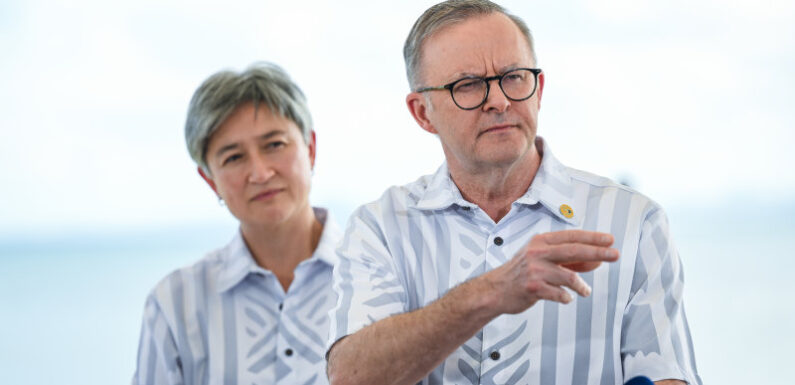
Save articles for later
Add articles to your saved list and come back to them any time.
Prime Minister Anthony Albanese says he hopes to meet Chinese President Xi Jinping in India next month as the federal government revamps its foreign aid policy for the first time in almost a decade in a bid to counter China’s ambitious influence-building efforts in the region.
The government will on Tuesday release its new overseas development policy, which seeks to offer countries in the Pacific and South-East Asia an appealing alternative to Beijing’s controversial Belt and Road infrastructure initiative and so-called “debt-trap” model of diplomacy.
Foreign Minister Penny Wong and Prime Minister Anthony Albanese at the Pacific Islands Forum last year.Credit: Joe Armao
As well as creating a $250 million fund to spur private investment in the Pacific, the government will mandate that all aid projects over $3 million have a gender equality objective and that at least half of such projects have a climate objective.
“Australia will concentrate our resources on the issues that matter most to our neighbours,” Foreign Minister Penny Wong said.
“We will offer genuine partnerships based on respect, listening and learning from each other.”
However, senior Labor sources warned the party’s official commitment to spend 0.5 per cent of gross domestic income on foreign aid was not achievable in the near future and was not a priority for the government.
Australia currently spends about 0.22 per cent of national income on foreign aid, among the lowest of any developed nation.
Under the new policy, foreign aid spending will increasingly focus on infrastructure projects, with a focus on local job creation rather than imported workers, as well as policing and security.
Beijing has been widely criticised for using imported Chinese workers for its overseas infrastructure projects and for saddling developing countries with unsustainable levels of debt.
As he mulls an official invitation to visit Beijing this year, Albanese told parliament he was hoping to meet with Xi on the sidelines of the G20 summit in Delhi in September.
Albanese met Xi for a breakthrough meeting at last year’s G20 summit in Bali, the first such meeting between Australian and Chinese leaders since 2016.
Albanese and Chinese President Xi Jinping in Bali last November.Credit: James Brickwood
“I met with Xi Jinping in November last year, and I’m sure that we will potentially meet again on the sidelines of the G20 meeting that will be coming up in the future,” Albanese said, while welcoming Beijing’s decision last week to drop tariffs on imported Australian barley.
It is unclear whether a meeting in Delhi would replace or be in addition to a Xi-Albanese meeting in Beijing, which it was widely speculated would occur in late October.
Last month, Solomon Islands Prime Minister Manasseh Sogavare lashed out at Australia and the United States, blasting them as “un-neighbourly” for criticising a security deal he signed with Beijing.
The new Australian aid policy, prepared by the Department of Foreign Affairs and Trade, warns public debt in the Pacific is expected to almost double from 2019 levels by 2025, a burden that will make it harder for developing nations to invest in health, education and social services.
“We will continue working with partner countries to find new avenues for growth and manage debt burdens,” the policy states.
The policy says the government will “ensure infrastructure programs prioritise local employment and procurement as another way of driving local development outcomes”.
The policy also states: “Recognising security and development are indivisible, we will help partners combat threats to community safety, stability and security, from terrorism and violent extremism, human and drug trafficking, and other types of transnational crime.”
The government will seek to increase transparency about Australia’s foreign aid spending by creating a new website that tracks government expenditure and project outcomes.
The government announced an extra $900 million for the Pacific in its first budget last October and this year announced an extra $1.4 billion over the next four years to expand security infrastructure and criminal justice co-operation in the Pacific.
Cut through the noise of federal politics with news, views and expert analysis from Jacqueline Maley. Subscribers can sign up to our weekly Inside Politics newsletter here.
Most Viewed in Politics
From our partners
Source: Read Full Article

